Farees’ new album, Blindsight, opens with a blistering cover of “Hey Joe.” And although the guitarist is heavily influenced by Hendrix and delivers a nearly spot-on rendition of the iconic solo in the middle of the song, he’s really displeased by the comparisons being bandied about in attempts to describe his own guitar prowess.
“It really pisses me off when they say ‘the new Jimi Hendrix,’ or ‘here’s the next Hendrix,’ or ‘the Jimi Hendrix of the Sahara’,” says Farees, who is of Tuareg and German/Italian heritage. “There’s only one Jimi Hendrix. It’s promotional bullshit, just to attract attention. World music is really a neocolonial system. It’s based on exoticism to this day, and so they always try to manufacture this exotic image—you see a person of color with an electric guitar, and you go, ‘Jimi Hendrix,’ which is racist. So, yeah, I don’t like the way Jimi is used. It’s profiting off the image of Jimi to promote someone else.”
Farees’ strong, articulate character permeates his musical output and vision. He’s a fiercely independent artist who wants to dictate his own terms within the music industry. And he’s fervently committed to dismantling the thinking around the neocolonial power dynamics that dictate much of capitalist society—check out his “Maneefesto” at farees.com for his incisive worldview. Regarding the music industry, he’s challenging what he calls “the age of shallowness and appearance.” As such, his music and lyrics are inextricably linked to the ideals and values that define him as a human being. There’s no separating the performer from the person. “I’m invested in societal change because I’m a musician. It’s as simple as that—it’s natural,” he proclaims.
FAREES feat. LEO NOCENTELLI of THE METERS - The Melting (Official Music Video)
On the bouncy and funky “The Melting,” Farees sets down his guitar and lets the Meters’ original guitarist, the legendary Leo Nocentelli, handle all the guitar parts.
When it comes to songcraft, Farees grounds himself in his traditional Tuareg heritage. For the uninitiated, the Tuareg people are a large nomadic ethnic group that principally inhabit a vast area of the Sahara. “It was a huge empire and, being nomadic, they were influenced by many different cultures, so you have a music and poetry style that’s very diverse,” he explains. “If you listen to traditional stuff from Timbuktu and the Niger River in West Africa, it really sounds like the blues. And since millennia Tuaregs had rap and spoken word. We had all of that in Africa.”
Farees started out playing guitar professionally as part of the Saharan music scene in the bands Tinariwen and Terakaft. His first record, Mississippi to Sahara (released under the name Faris in 2015), assayed the traditional rural blues of Mississippi through the lens of a Tuareg style. It is an unequivocal tour de force of mostly solo guitar playing. The album caught the ears of Taj Mahal and Ben Harper, who quickly embraced both his musical ambition and his social mission. And even though it was a low-budget project, recorded in just a couple days, Mississippi to Sahara contains all the hallmarks of the highly rhythmic approach that would come to define his guitar playing, producing, and songwriting on future albums.
In 2020, he released Border Patrol and Both Sides of the Border, two collections of genre-hopping, guitar-heavy protest songs, including Border Patrol’s “Y’all Don’t Know What’s Going On,” a collaboration with U.S.-based indie-rock band Calexico. Drawing on his own experience of being profiled, arrested, and detained during an American tour, his spoken-word poetry on Border Patrol harks back to the late-’60s protest traditions of artists like Bob Marley and Hendrix. Farees employs spoken word throughout much of his music and says that this came out of necessity. “I have too much to say for just standard lyrics,” he chuckles.
“World music is really a neocolonial system. It’s based on exoticism to this day, and so they always try to manufacture this exotic image.”
Farees’ recent release, Blindsight, continues his genre-bending, socially responsive musical trajectory. Through bombastic funk, conscious but raucous hip-hop, and psychedelic blues, Blindsight affirms the signature “wall of groove” production style he is becoming known for. “I guess that’s my African ancestry,” he says. “Rhythm always comes first. I always lay down a wall of different rhythm tracks on different instruments—drums, bass, keyboards, guitars, or percussion—and then, once I have this wall of groove underneath, every melody comes alive. That’s the way I think as a producer.” A prime example is “The Melting,” featuring Leo Nocentelli from the original Meters line-up on guitar. The song is like a jigsaw puzzle of cascading rhythms and contrapuntal melodies—including a busy and melodic bass line—that coalesce with astonishing fluidity.
The Meters are another of the Farees’ big Western influences, so it was quite an honor to have Nocentelli onboard. “We met online,” recalls Farees. “I asked him, ‘Do you feel like you could play some guitar on one of my tracks?’ And he was like, ‘Sure, man.’ So, it was a dream come true for me. Now it’s more of a spiritual connection—we became like brothers.” Nocentelli performed all the guitar parts on “The Melting.” “I didn’t touch the guitars, specifically to leave room for him,” says Farees.
At the time of this interview, Farees had just played with Nocentelli’s band at the 2022 New Orleans Jazz & Heritage Festival in support of the Meters guitarist’s own much-heralded, recently released lost 1971 solo album, Another Side. Nocentelli says he was drawn to Farees because he’s a unique person with unique ideas: “His music is like a mixture of dialects and musical interpretations from various parts of the world, and I like that.”
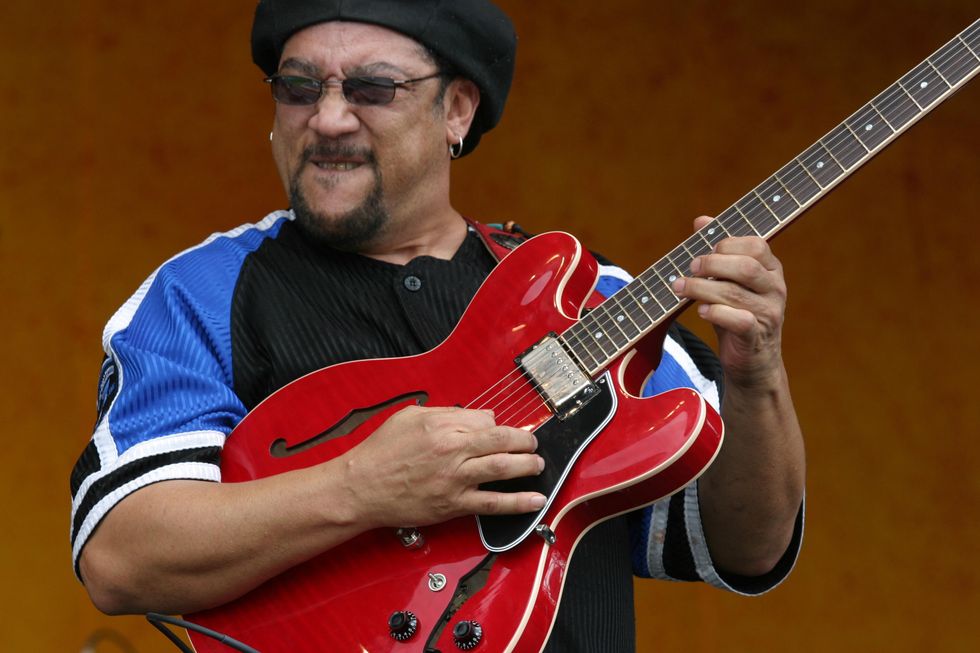
After meeting Leo Nocentelli online, Farees asked the original Meters’ guitarist to play a feature track on Blindsight. The famed 6-stringer said yes and handles all the guitar parts on “The Melting.” This year, Farees joined Nocentelli’s band at the New Orleans Jazz & Heritage Festival.
Photo by Joseph A. Rosen
For “The Melting,” Nocentelli used a Gibson ES-335, direct through the board. “I’m old school,” he says. “I like the direct sound if I’m tracking a clean sound, especially rhythm. When you hear Jimmy Nolen with James Brown, the guitar is clean. There’s no distortion or anything like that. Al McKay from Earth, Wind & Fire, too—his rhythms were sparkling clean, and I try to duplicate that.”
Clearly, Farees isn’t content to be defined solely by his guitar playing, good as it may be. Collaboration, whether with Nocentelli or Calexico, is a driving force in his life. “I love to create,” he attests. “The guitar was my first instrument, but then I had to explore, and I think that’s how it’s going to be with me. I just love sound.” On “Fuck You, I’m Black,” he even plays the banjo, tuned in a Tuareg style. “It’s tuned the same way the Tuareg tune their lutes. Tuaregs have nine or 10 different [open] tunings based on the songs. Probably the easiest one, and the one we use most, is the low ‘E’—you tune it up to ‘G.’ And then you play in ‘G,’ and you have all kinds of scales and stuff to do.” [A typical Tuareg open G tuning is G–A–D–G–B–E.]
But Farees points out that he is a completely self-taught guitarist and doesn’t know anything about Western music theory. “I don’t know what notes I’m playing,” he admits. “I don’t count the rhythms. I just do everything by instinct, so there’s a lot of mystery to it. Most of the things I do, I don’t know how I’m doing them. I just do them. I guess it comes from above, as they say.”
Farees’ Gear
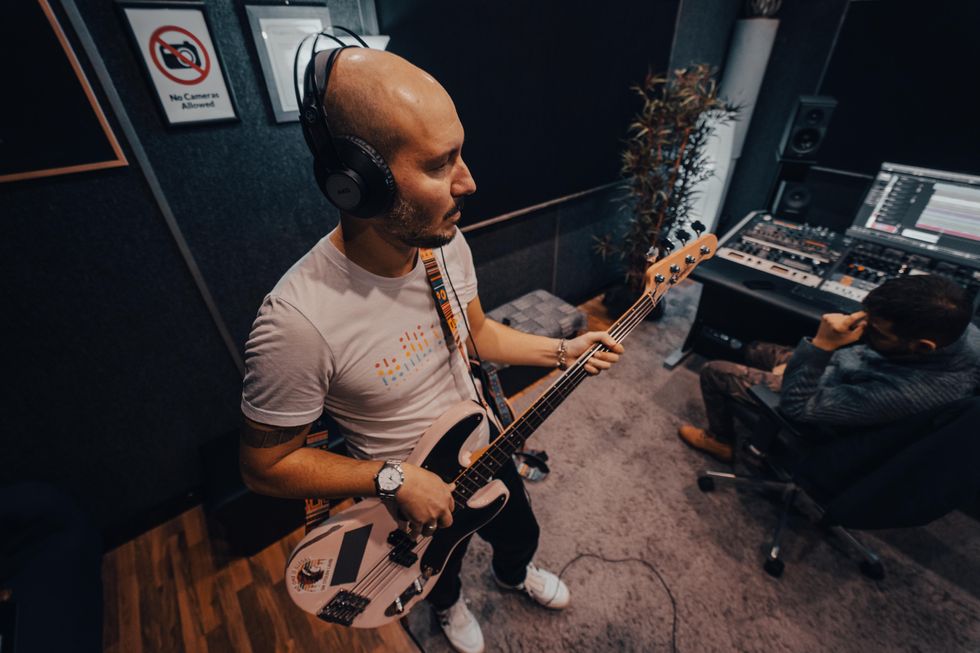
Seen here tracking bass parts, Farees says he wrote most of Blindsight at the keyboard.
Photo by Rafaelle Serra
Guitars
- Numerous customized Squier Strats with Q pickups
- ES-style with vintage-type Q humbuckers
- Squier Starcaster
- Greco 1978 triple-humbucker LP copy
- Greco 1979 S-style
- Danelectro 12-string electric
Amps
- Vox Pathfinder 10
- Custom 25W head based on Fender Bronco circuit
- Replica JTM45 head
- 1963 GEM Deluxe combo
- 1973 Davoli Tuono combo
- Custom 4x12 cabinet with Celestion Greenbacks
Effects
- Custom-made Fuzz pedals
- Two custom-made Univibe-style pedals (one has more output and a stronger preamp section)
- ’70s Jen Phase Shifter
- Rocktron Banshee Talkbox
Wahs
- Custom-made or modded wah pedals
- 1966 Vox Clyde McCoy wah
- Various ’70s Italian-made wahs
Strings and Picks
- GHS Strings (.010–.038)
- Planet Waves Medium 0.70 mm picks
He also doesn’t ascribe to a single playing technique. “I play every style—fingerpicking, picks,” he attests. “Usually, for a pick, I use the butt of the pick, not the front. It gives me more speed and fattens the sound.” And when it comes to gear, Farees makes sure that his instrument choices align with his thinking—a kind of a practice-what-you-preach methodology. “People are starting to watch what an artist says and does,” he explains. “It has to align with what you say. I’d rather go to a small artisan that produces quality stuff by hand. That’s why I endorse Q Pickups. For a set of pickups, the most pricey are maybe $150. They don’t charge you for the brand. No bullshit and real quality. That’s what I’m about.
“The sound is part of the song for me, so it’s really important. I work a lot on my sound,” he continues, explaining that he finds “incredible sounds using incredibly cheap gear” and cites the rhythm guitar track on “Hey Joe.” “That’s the Vox Pathfinder 10, and it’s an awesome amp. I don’t know how they did that circuit, but it sounds like a big Marshall amp, and it’s just a transistor, super-small practice amp.” He mostly plays Squier guitars, as well as a pair of ’70s Greco guitars from Japan. “They’re incredible,” he says. “The Japanese craftsmanship in the ’70s was incredible. If you do a blind test with a vintage ’68 Strat, you probably won’t notice any difference.” For the outro solo on “Hey Joe,” he used an unnamed vintage Italian-made phase shifter and a custom-made JTM45-replica head with an Orange bass cab. “I love bass cabs, rather than guitar cabs, because they add more fat to my tone.”
“I love bass cabs, rather than guitar cabs, because they add more fat to my tone.”
Farees’ values are reflected in all aspects of his music. He’s put in his time hustling to set up his own label and distribute his records worldwide, and feels that he’s now a truly independent musician. Farees says that his 2020 release Border Patrol was finished for two-and-a-half years before it came out as he prepared the infrastructure needed to be truly free of record companies and the hierarchy that goes along with that side of the business. “I was contacted by major labels, but they wanted to censor me and change my whole persona,” he explains. “They’ve tried to change my song titles, change the album titles. I wanted a double LP, and they were like, ‘No. It has to be a single LP.’”
The music and the message are important to Farees, not marketing or sales concerns. “I make music because I really believe in good music and good values,” he explains. “It’s about bringing something good and something new to the table, and not doing what everybody else is doing or imitating. I think that’s an artist’s responsibility. Not that you have to revolutionize or change everything—just bring your own thing to the table.”
Blindsight
Blindsight opens with a blistering, funky version of “Hey Joe,” but Farees rejects the idea of using Hendrix to self-aggrandize: “I don’t like the way Jimi is used. It’s profiting off of the image of Jimi to promote someone else, and it’s bullshit.”
Farees - HEY JOE (Isolated Guitar)
PG Exclusive: Check out the isolated guitar tracks from "Hey Joe" off Farees' new album, Blindsight.


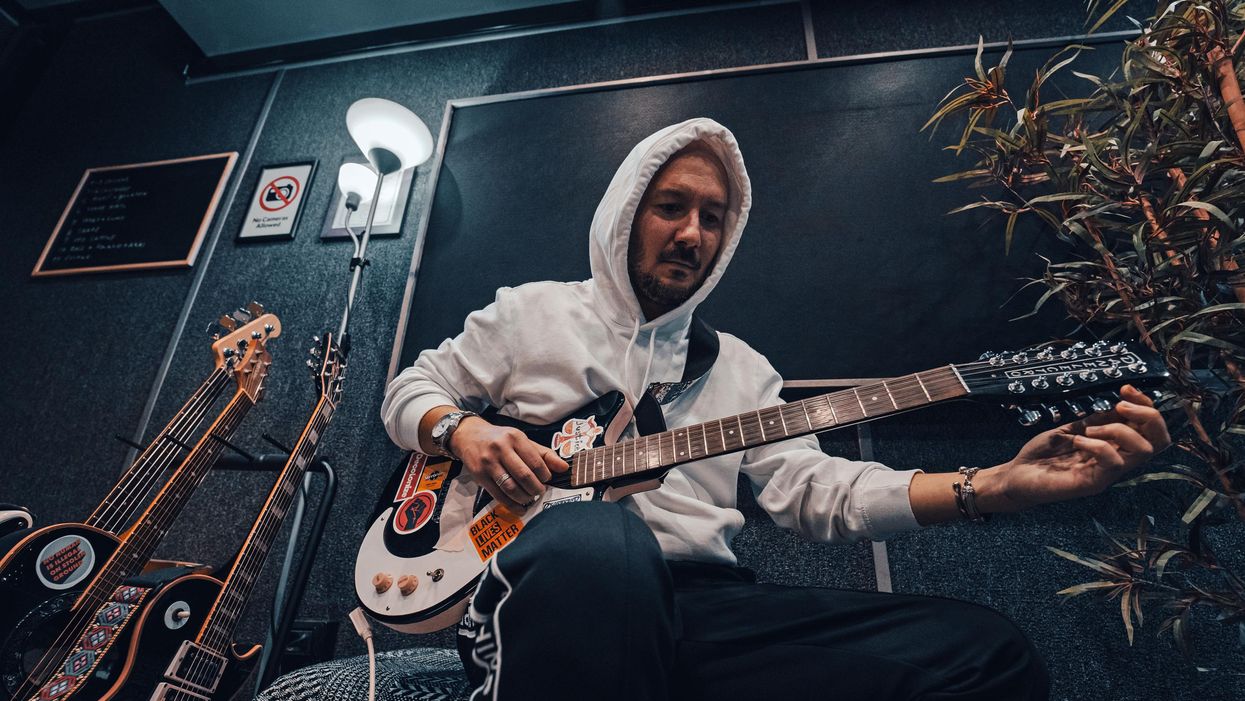








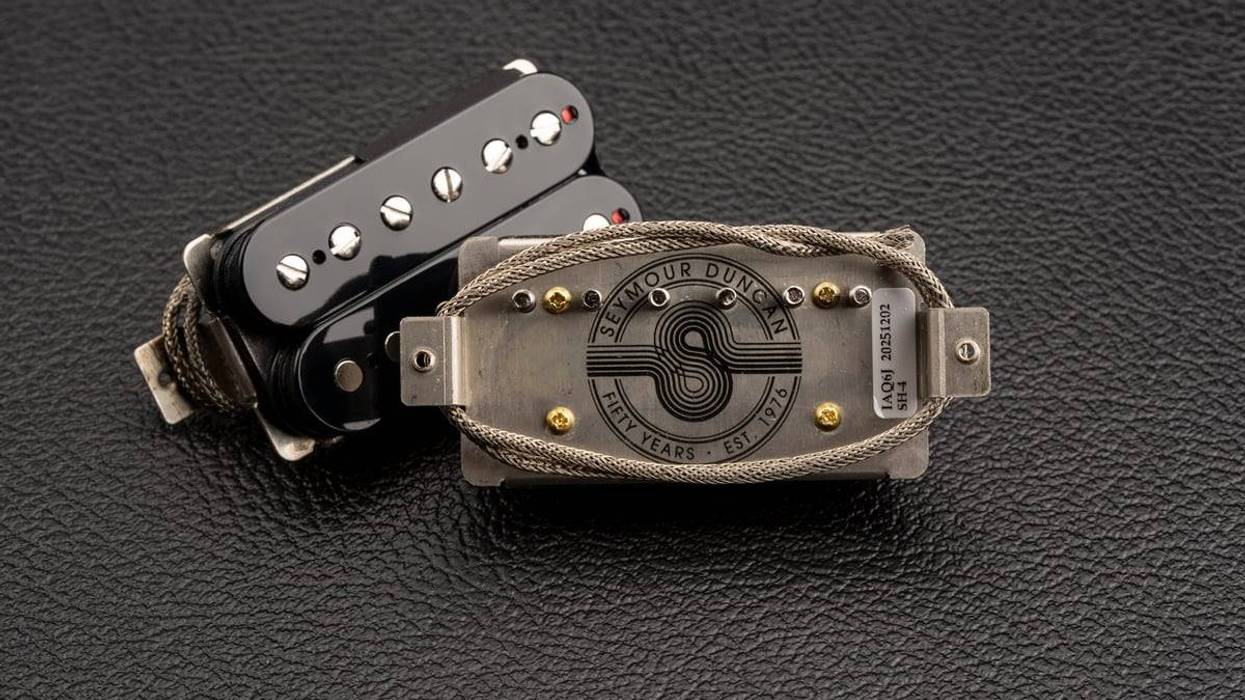


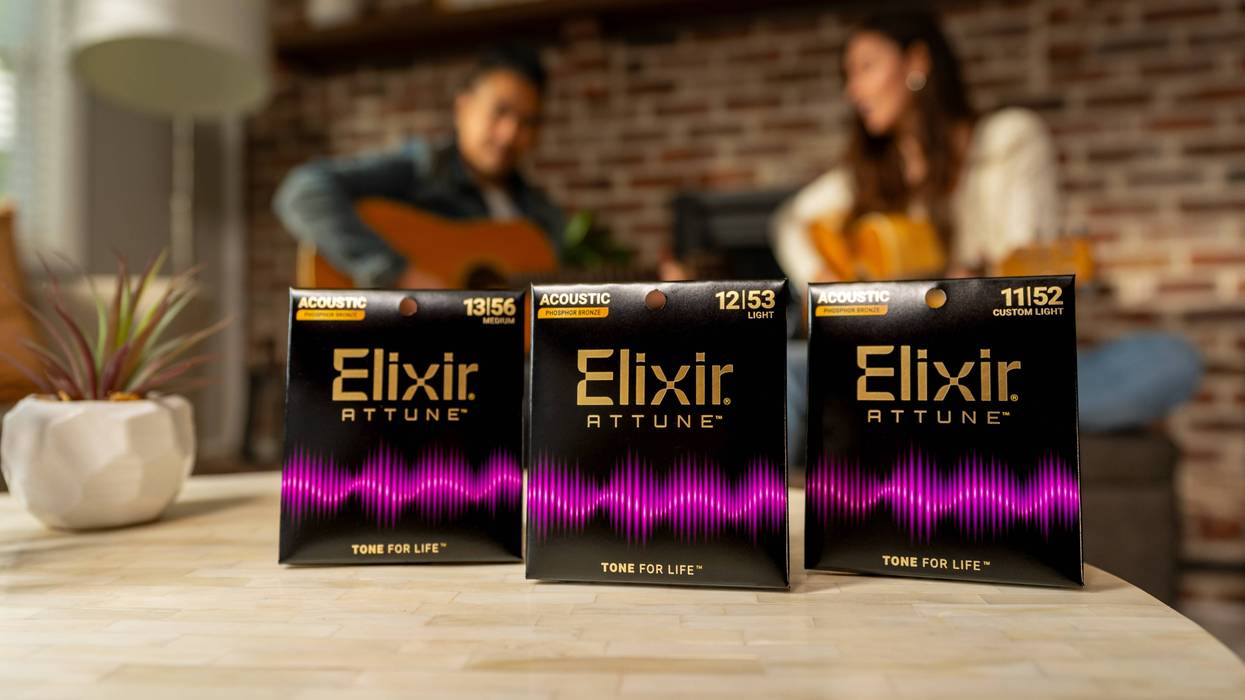





![Rig Rundown: Russian Circles’ Mike Sullivan [2025]](https://www.premierguitar.com/media-library/youtube.jpg?id=62303631&width=1245&height=700&quality=70&coordinates=0%2C0%2C0%2C0)






